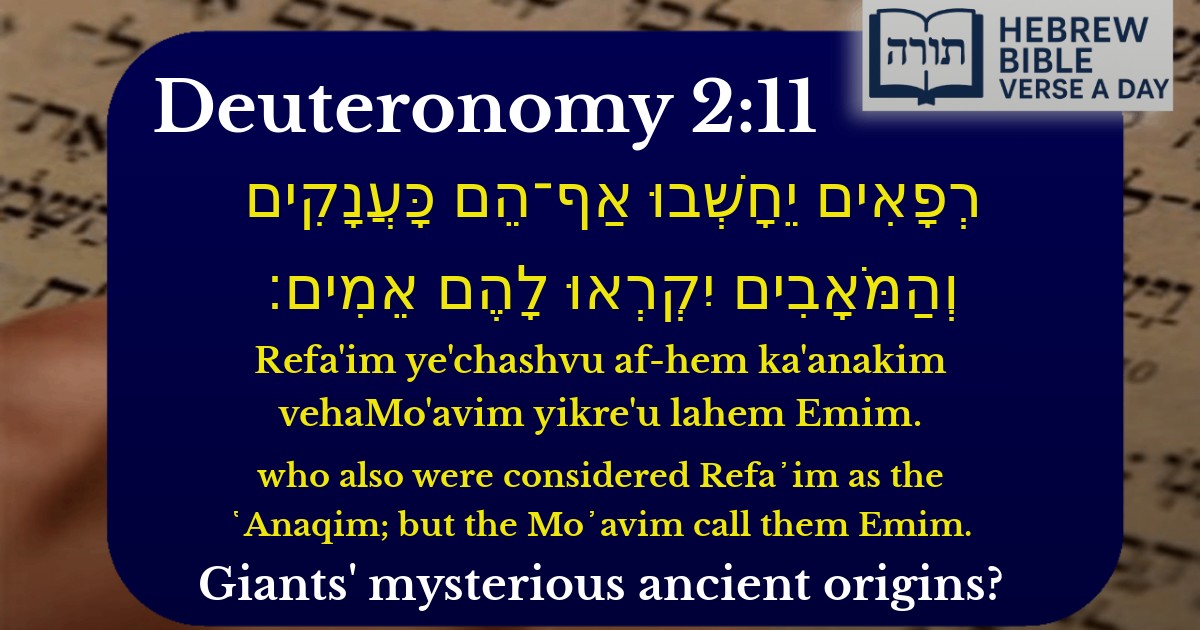Frequently Asked Questions
Q: Who are the Refa'im mentioned in Deuteronomy 2:11?
A: The Refa'im were a group of ancient giants who lived in the land before the Israelites. According to Rashi and other traditional Jewish sources, they were known for their great size and strength, similar to the 'Anakim (another giant nation). The Torah mentions them to emphasize the formidable nature of the inhabitants in the lands the Israelites would encounter.
Q: Why does the Torah mention that the Mo'avim called them 'Emim'?
A: The Torah notes that the Mo'avim referred to the Refa'im as 'Emim' (meaning 'terrors' or 'dreaded ones') to show how different nations had different names for these giants. This teaches us that historical accounts can vary based on perspective, but the Torah provides the true and divinely inspired narrative.
Q: What lesson can we learn from the mention of the Refa'im in this verse?
A: The mention of the Refa'im reminds us that Hashem guides history and fulfills His promises. Despite the intimidating presence of these giants, the Israelites, with divine help, were able to overcome them when conquering the land. This teaches trust in Hashem's plan, even when facing seemingly insurmountable challenges.
Q: How does this verse connect to other mentions of giants in the Torah?
A: This verse connects to other references (like the Nephilim in Genesis or the Anakim in Numbers) to show that giants were a recurring presence in ancient times. The Talmud and Midrash explain that these nations were descendants of the fallen angels or possessed unique physical traits, but their strength did not prevent Hashem from ensuring the Israelites' success.
Q: Why is it important to know about the Refa'im and other ancient nations?
A: Knowing about the Refa'im and other ancient nations helps us appreciate the miracles and divine assistance the Israelites received. The Rambam teaches that recognizing these historical details strengthens our faith in the Torah's accuracy and reinforces the idea that Hashem controls all events, even against powerful enemies.


Understanding the Verse in Context
The verse (Devarim 2:11) discusses the ancient inhabitants of the land, comparing the Refa'im to the 'Anakim and noting that the Moabites referred to them as Emim. This passage appears in the context of Moshe recounting the journey of Bnei Yisrael through the wilderness and their encounters with neighboring nations.
Rashi's Commentary
Rashi (Devarim 2:11) explains that the Refa'im were a mighty and tall people, similar to the 'Anakim, who were known for their giant stature (as seen in Bamidbar 13:33). The name Emim, given by the Moabites, means "terrors" or "dreaded ones," indicating their fearsome reputation. Rashi also notes that these nations were descendants of the Rephaim mentioned in Bereishit 14:5, linking them to ancient warrior clans.
Midrashic Insights
Rambam's Perspective
In Moreh Nevuchim (Guide for the Perplexed 3:50), Rambam interprets the mention of these nations as a historical account meant to highlight the miraculous nature of Bnei Yisrael's conquest. Despite facing formidable foes like the Refa'im and 'Anakim, Hashem assured their victory, demonstrating Divine intervention.
Halachic and Moral Implications
The Kli Yakar (Devarim 2:11) draws a lesson from this verse: just as the Moabites feared the Emim, Bnei Yisrael should recognize that their strength comes from Hashem, not physical might. This aligns with the broader theme in Sefer Devarim of trusting in Divine providence rather than human power.